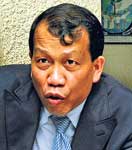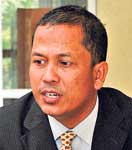
The Aceh experience and lessons for Sri LankaHamid Awaluddin, the former Minister of Justice and Human Rights in Indonesia and the chief negotiator for the government who signed the peace accord with the Free Aceh Movement (GAM) in 2005, believes Sri Lanka has much to draw from the Aceh experience and the remarkable achievements of its peace process. Awaluddin, was among those who attended the seminar ‘The Story of Aceh: Insights’, organized by Muslim Aid in collaboration with the United Methodist Committee on Relief (UMCOR), the Methodist Church and the Indonesian Embassy in Colombo last week.
The Memorandum of Understanding which was signed between the Indonesian Government and GAM on August 15, 2005 aimed at bringing a lasting peace with dignity for all, to one of the longest running conflicts in Asia. Although there have been many attempts at peace over the years, little success has been achieved. “The aim of the agreement was very clear – to bring a peaceful and comprehensive solution to the armed conflict based on a win-win situation for both parties involved”. Awaluddin said “it was vital that no one lost and that both parties were satisfied with the conditions laid out. The government did not make any demands, but rather made practical offers and ensured that these were fulfilled. In return, GAM had certain requirements to deliver”. The Indonesian government promised broad autonomy, including political participation and the right to form local political parties, local control over a portion of the revenues from natural resources in the oil-and-gas-rich province, re-location of Indonesian security forces out of Aceh, respect for human rights, release and amnesty for political prisoners and a dispute settlement mechanism. In exchange GAM had to give up its armed struggle and hand over all its weapons. Awaluddin said the commitment and determination of parties involved is vital in achieving peace. He went on to explain that the willingness of the democratically elected government in Jakarta and the decision of GAM to give up its long-standing demand for independence and the devastating tsunami were key factors. He also said that parties need to build mutual understanding and trust through direct dialogue although an outside facilitator could be used to conduct negotiations. Adli Abdullah, a lecturer at Banda Aceh’s Syiah Kuala University, Faculty of Law and General Secretary of Panglima Laot (a traditional fishermen’s co-operative association) said that the people of Aceh could now enjoy freedom of life and movement, which they lacked during nearly 30 years of conflict. “No longer are women becoming widows, children being orphaned or schools being burned. Additional business hours have been created with the shops being open till late. Over the years we have wasted our energy and resources for war, but now we can utilize these for development”, he said. |
|| Front
Page | News | Editorial | Columns | Sports | Plus | Financial
Times | International | Mirror | TV
Times | Funday
Times || |
| |
Reproduction of articles permitted when used without any alterations to contents and the source. |
© Copyright
2007 | Wijeya
Newspapers Ltd.Colombo. Sri Lanka. All Rights Reserved. |

